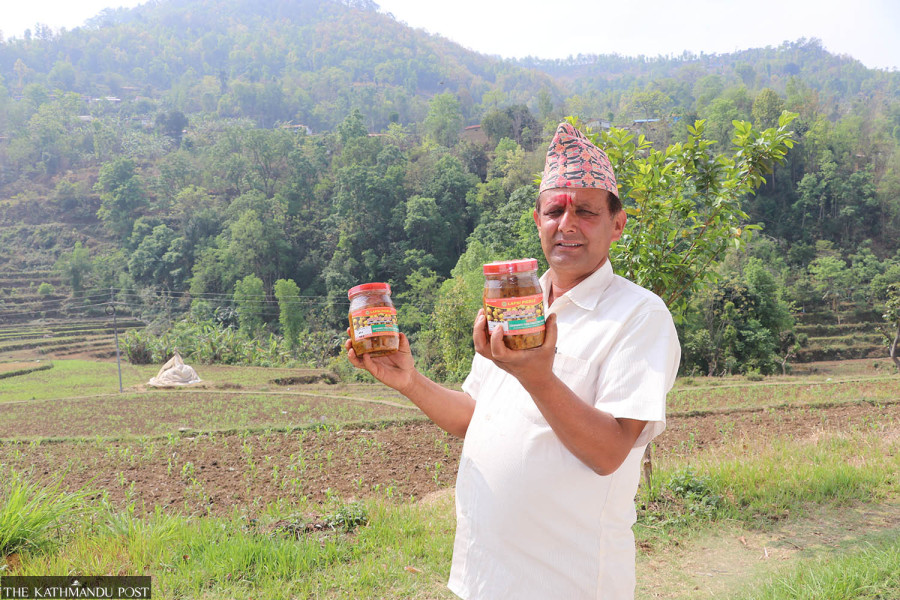Money
How Thaneshwar Bhusal turned lapsi into a brand
Lapsi, a sour fruit that grows in the wild, is known for its tangy and appetising taste. Its unique flavour makes it ideal for pickles and condiments.
Suman Jung Thapa
Fifty-six-year-old Thaneshwar Bhusal of Mudikuwa, Phalebas Municipality–4, never imagined that lapsi—the tart fruit often left to rot in nearby forests—could become a source of income.
For years, Bhusal had watched lapsi trees bear fruit that fell and decayed. Until 2001, no one had made him realise the potential of this neglected wild fruit.
Former Nepali Congress lawmaker Rishikesh Tiwari introduced the idea of linking politics to entrepreneurship. Although he wasn’t the lawmaker in 2001, he helped establish the Parbat Community Development Organisation and became its first chairperson.
Through this organisation, Bhusal learned for the first time that wild fruits like lapsi and amala could be collected and processed for commercial gains.
With a background in agriculture technology, Bhusal became a member—and even a staffer briefly—of the newly formed organisation. Within a year, he left the job and transitioned fully into entrepreneurship.
For 23 years, he has been running a food processing business near the Kushma-Mudikuwa suspension bridge.
“In the year the organisation was founded, around 20 to 25 of us went to Kathmandu for training in food processing,” Bhusal recalls. “The original plan was for the organisation to manage the processing unit. But I decided to start the business independently due to legal complications.”
Armed with just 15 days of training, he began producing lapsi-based items such as candy, pickles, jam, titaura (spicy dried snacks), and fruit pulp. The idea that money could be made from this once-wasted fruit quickly spread through the village.
Bhusal still remembers his excitement: “I bought my first batch of lapsi for Rs6 a kilo. Today, it goes for Rs50.”
While processing the fruit was relatively easy, marketing the finished products was a serious challenge. “We went from market to market, festival to festival, setting up stalls wherever there were crowds,” he says. “We had to educate people on lapsi, offer free samples, and do a lot of convincing.”
He remembers with appreciation the unwavering support of his fellow organisation members during those tough early days.
Lapsi, a sour fruit that grows in the wild, is known for its tangy and appetising taste. Its unique flavour made it ideal for pickles and condiments, which quickly found a loyal customer base. However, Bhusal notes that the Covid-19 pandemic severely impacted his business, cutting sales by nearly half.
He used to sell 25 to 30 quintals of pickled lapsi and amla annually. These days, that figure has dropped to around 15 quintals. “We earn about a 30 percent profit on sales,” he explains. “In the past, I made Rs1.3 to Rs1.4 million annually. Now it's down to around Rs600,000 to Rs700,000.”
Bhusal expanded into producing satu (a roasted flour mix) about four years ago to keep the business running year round. He blends maize, chickpeas, wheat, soybeans, buckwheat, barley, and peanuts to make a nutritious mix. “It’s been well received, especially among people from Parbat now living in the US, Japan, and Europe,” he says.
He sells around 15 quintals of satu annually and has also started producing digestive powders from harro and barro (native fruits with medicinal properties).
Before the pandemic, Bhusal’s products had a steady market in towns like Parbat, Baglung, Pokhara, and Kathmandu, with growing interest even from abroad.
But Covid-19 brought everything to a halt. “I lost over Rs5 million during the pandemic,” he says. “Just as the first wave subsided, another came. Since our products are perishable, we had to discard everything we produced for two consecutive years.”
Even though his factory was insured, Bhusal received no compensation for the lost products. “The insurance only covered damage to the factory, not the goods,” he says.
He also shared a similar experience from 2015: a landslide swept away his machinery and inventory. “The insurance company asked me for photos of the destroyed goods,” he recalls bitterly. “Since I didn’t have any, they refused the claim.”
Today, Bhusal gets help from his 27-year-old son. Shishir handles raw materials sourcing, delivery, and social media promotion. Occasionally, his wife and daughter-in-law step in during labour shortages. Three local women work full time at the factory, and an additional six or seven workers are hired during peak season.
Bhusal, who holds a Level 2 vocational certification from CTEVT in agricultural enterprise, also trains others in pickle-making. So far, he has taught more than 3,000 people how to make pickles from lapsi, amla, and meat.
“Our training covers more than just production techniques,” he says. “We also teach pricing strategies, market timing, and branding.”
His factory processes about 50 tonnes of lapsi annually, sourced from the surrounding villages like Mudikuwa, Devisthan, Limithana, Thanamaula, and Shankarpokhari. Because lapsi is native to Nepal and not grown in India or China, Bhusal believes it has enormous export potential.
“If we can produce high-quality Hajmola (digestive candy) and refined lapsi candies, there’s real scope to succeed in foreign markets,” he says confidently.
However, he expresses frustration at the government’s grant system, which he claims is unnecessarily complicated and unhelpful to real farmers. “Government staff should visit the farms directly and handle documentation on-site,” he argues. “How can a farmer keep running to the municipality office and still manage their fieldwork?”
Despite conducting training sessions across many municipalities in Nepal, Bhusal feels overlooked by his own Phalebas Municipality. He is particularly disappointed with the mayor, Gangadhar Tiwari.
“We set up stalls at festivals to promote local products,” he says. “We even offered to display the municipality’s banner, so its name would gain exposure. But the mayor never showed any interest.”




 19.28°C Kathmandu
19.28°C Kathmandu













